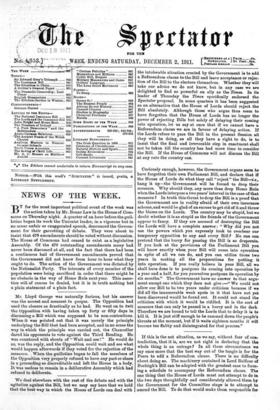Curiously enough, however, the Government organs seem to have forgotten
their own Parliament Bill, and declare that if the House of Lords do what they call "reject" the Bill—i.e., hang it up—the Government will be forced to drop their measure. Why should they, any more than drop Home Rule when the Lords interpose a two years' interval in the case of that measure ? In truth this threat to drop the Bill is a proof that the Government are in reality afraid of their own insurance scheme, and would be glad of an excuse to get rid of it and throw the blame on the Lords. The country may be stupid, but we doubt whether it is as stupid as the friends of the Government appear to fancy. If they are accused of destroying the Bill the Lords will have a complete answer : " Why did you not use the powers which you expressly took to overbear our temporary opposition to any and every Bill ? No one can pretend that the hurry for passing the Bill is so desperate. If you look at the provisions of the Parliament Bill you will know exactly when your Bill will come into operation in spite of all we can do, and you can utilize those two years in making all the preparations for putting it into operation. If you really believe in your Bill, all we shall have done is to postpone its coming into operation by a year and a half, for you yourselves postpone its operation by six months." The Government have no answer to that argu- ment except one which they dare not give :—" We could not allow our Bill to be two years under criticism because if we did all the innumerable weak spots in it that have not yet been discovered would be found out. It could not stand the criticism with which it would be riddled. It is the sort of measure that can only be passed in a hurry and in the dark. Therefore we are bound to tell the Lords that to delay it is to kill it. It is just stiff enough to be rammed down the people's throats at the moment, but if it waits eighteen months it will become too flabby and disintegrated for that process."


































































 Previous page
Previous page